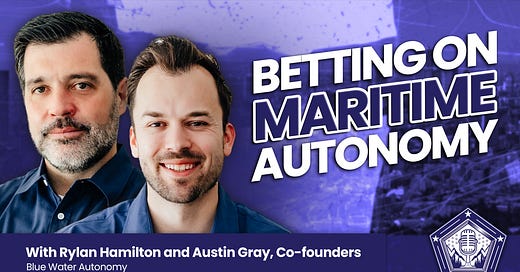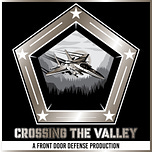About Rylan and Austin
Rylan Hamilton brings a blend of military and entrepreneurial experience to maritime autonomy. As a former Surface Warfare Officer in the Navy, he spent four years understanding the complexities of naval operations firsthand. His civilian career includes leadership roles at TaskRabbit and building sophisticated factory automation systems for Kiva and Amazon. Most recently, he built and sold a logistics company to Shopify—bringing crucial scaling experience to this new venture.
Austin Gray represents the newer generation of defense-tech entrepreneurs, having served as a naval intelligence officer before pursuing a dual degree at Harvard Business School and MIT. His unconventional choice to spend a summer working in a Ukrainian drone factory instead of following the typical consultant path provided firsthand exposure to rapid battlefield innovation and the speed at which technology can move from development to combat deployment.
The third co-founder, Scott (their CTO), brings critical manufacturing expertise as the former VP of Manufacturing for Roomba, where he helped scale production from prototype to millions of units.
About Blue Water Autonomy
Founded in spring 2024 and based in Boston, Blue Water Autonomy is designing and building autonomous ships with a "defense first, dual-use" approach. Their first customer is the U.S. Navy.
What distinguishes BWA from other players in the space is their focus on developing autonomous vessels that can operate without chase boats or constant human maintenance—something the founders identify as a critical gap in current capabilities. Rather than building small $100,000 unmanned surface vessels, they're targeting multi-million dollar platforms that can truly complement the Navy's manned fleet.
The company has already put a test vessel in the water outside Boston where they're testing hardware and software integration. They aim to have their first prototype vessel in the water sometime in 2025, with the ultimate goal of building autonomous ships at scale.
Their vision is to help the Navy implement "distributed maritime operations" through a disaggregated architecture—similar to how the satellite industry evolved from a few hundred expensive satellites to thousands of smaller, distributed ones.
Key Takeaways
Make informed bets ahead of requirements: "We're trying to get ahead of the program office... everyone we talk to says, yes, we need what you're building. But we're trying to get ahead of them because in three years, when the requirements are finally finalized, you might start working on this. But we're going to jump that." The founders recognize that startups must sometimes anticipate future needs rather than wait for formal requirements.
Balance customer feedback across the organization: "If you just talk to one person, that's not the Navy. The Navy is tens of thousands of people or hundreds of thousands all over." BWA approaches customer discovery holistically, gathering feedback from program offices, engineering experts, and end-users to synthesize a more complete understanding of needs.
Solve for reliability and producibility simultaneously: "There's a really interesting tension... you can't just over-engineer your reliability like maybe you would for a mission-critical spaceflight... because then you're not going to have something you can produce many of." Successful defense hardware startups must navigate this balance between building something that works flawlessly and designing for manufacturing at scale.
Focus on design advantages specific to autonomous systems: "We think about it as like a computer on a keel... we're rethinking everything about how you build a manned ship today, which means that we can think about designing it for manufacturing." By approaching the problem from first principles rather than simply removing humans from existing ship designs, BWA sees opportunities to radically improve manufacturability.
Confront cultural barriers to adoption: "We have not used our unmanned maritime capability in combat yet, despite having a whole year of combat operations in the Red Sea recently." The founders identify that beyond technical challenges, cultural and institutional barriers to deploying autonomous systems present significant hurdles—and opportunities for companies that can help bridge this gap.
The Blue Water Autonomy story encapsulates the current state of defense tech entrepreneurship: technically experienced founders making informed bets on capabilities they believe will be needed, working to overcome institutional inertia, and applying commercial best practices to defense problems. Their journey will be worth following closely as they navigate the challenging waters of defense procurement.
For more on our first Launch Day feature:
Website: https://blw.ai
LinkedIn: https://www.linkedin.com/company/blue-water-autonomy/
Twitter: @BlueWaterShips














Share this post